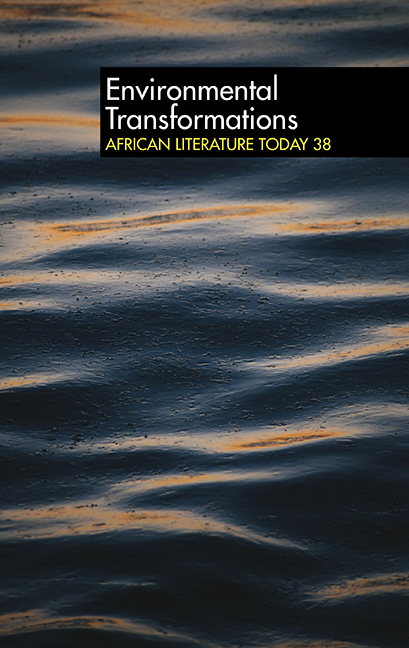Book contents
- Frontmatter
- Contents
- Notes on Contributors
- Introduction: Itinerariesof African Ecocriticism and Environmental Transformations in African Literature
- Literary Totemism and its Relevance for Animal Advocacy: A Zoocritical Engagement with Kofi Anyidoho’s Literary Bees
- Reading for Background: Suyi Davies Okungbowa’s David Mogo, Godhunter and ‘the end of the world as we know it’
- Poetics of Landscape: Representation of Lagos as a ‘Modernizing’ City in Nigerian Poetry
- Poetic Style and Anthropogenic Ecological Adversity in Steve Chimombo’s Poems
- Female Autonomy in Kaine Agary’s Yellow-Yellow
- Local Collisions: Oil on Water, Postcolonial Ecocriticism, and the Politics of Form
- ‘It is the Writer’s Place to Stand with the Oppressed’: Anthropocene Discourses in John Ngong Kum Ngong’s Blot on the Landscape and The Tears of the Earth
- Black Atlantic Futurism, Toxic Discourses and Decolonizing the Anthropocene in Nnedi Okorafor’s The Book of Phoenix
- Readings into the Plantationocene: From the Slave Narrative of Charles Ball to the Speculative Histories of Octavia Butler and Nnedi Okorafor
- INTERVIEW
- LITERARY SUPPLEMENT
- TRIBUTE
- REVIEWS
Sadia Zulfiqar, African Women Writers and the Politics of Gender
Published online by Cambridge University Press: 07 November 2020
- Frontmatter
- Contents
- Notes on Contributors
- Introduction: Itinerariesof African Ecocriticism and Environmental Transformations in African Literature
- Literary Totemism and its Relevance for Animal Advocacy: A Zoocritical Engagement with Kofi Anyidoho’s Literary Bees
- Reading for Background: Suyi Davies Okungbowa’s David Mogo, Godhunter and ‘the end of the world as we know it’
- Poetics of Landscape: Representation of Lagos as a ‘Modernizing’ City in Nigerian Poetry
- Poetic Style and Anthropogenic Ecological Adversity in Steve Chimombo’s Poems
- Female Autonomy in Kaine Agary’s Yellow-Yellow
- Local Collisions: Oil on Water, Postcolonial Ecocriticism, and the Politics of Form
- ‘It is the Writer’s Place to Stand with the Oppressed’: Anthropocene Discourses in John Ngong Kum Ngong’s Blot on the Landscape and The Tears of the Earth
- Black Atlantic Futurism, Toxic Discourses and Decolonizing the Anthropocene in Nnedi Okorafor’s The Book of Phoenix
- Readings into the Plantationocene: From the Slave Narrative of Charles Ball to the Speculative Histories of Octavia Butler and Nnedi Okorafor
- INTERVIEW
- LITERARY SUPPLEMENT
- TRIBUTE
- REVIEWS
Summary
This book comprises an introduction, five chapters, a conclusion, and bibliography. It is a compendium of oeuvres by African women, with the introduction providing an extensive background of vibrant oral traditional performances by African women, and how those evolved to constitute credible foundations for the literary consciousness by certain renowned African female writers. The introduction offers an insightful panorama of traditional renditions – such as songs, recitals, chants – which women necessarily performed from preliterate times to authenticate scenarios, situations and processes that prevail in various African societies. Unfortunately, despite this robust array of women's active contributions to literary forms, women did not feature on the modern African literary platform through much of the 1970s. Notably, after few of them had started publishing creative works, the early critics (who also were male) either did not acknowledge them, or deliberately disregarded their works as unserious, immature, inferior and undeserving of any attention. It was apparent that the early critics – Eustace Palmer, Gerald Moore, Eldred Jones, and others – could not imagine women writers enjoying critical responses alongside such writers as Chinua Achebe, Ngugi wa Thiong’o, Wole Soyinka, Cyprian Ekwensi.
Evidently, Flora Nwapa's Efuru and Grace Ogot's The Promised Land were published in 1966, but from the early 1970s when there was a proliferation of critical responses to African literary works, the women's writings were not given any attention. Zulfiqar notes that the condescending treatment of the women writers by the male critics did not deter the women. By the mid 1980s, there were several forms of inquiries on, by and about women, which have steadily increased over the decades. In African Women Writers and the Politics of Gender, Zulfiqar undertakes a close assessment of the different literary works by women, and indicates that the works reveal women not as perpetuators, but creators, who envision an egalitarian society that transcends the myopic and repressive tendencies which operate among many readers, scholars and critics of African literature.
Essentially, Zulfiqar evaluates the corpora of African female writers who have emerged in the last forty years. They include Mariama Ba (Senegal), Buchi Emecheta (Nigeria), Chimamanda Ngozi Adichie (Nigeria), Tsitsi Dangarembga (Zimbabwe), and Leila Abuolela (Sudan).
- Type
- Chapter
- Information
- ALT 38 Environmental TransformationsAfrican Literature Today, pp. 182 - 187Publisher: Boydell & BrewerPrint publication year: 2020



